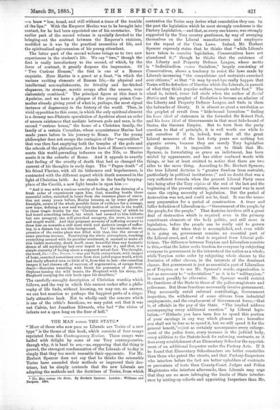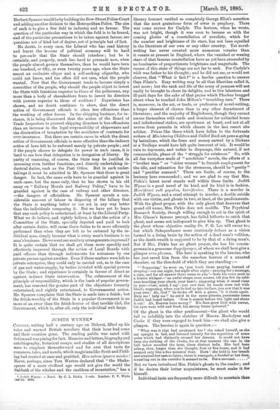THE MAN versus THE STATE.* " MosT of those who
now pass as Liberals are Tories of a new type" is the theme of this book, which consists of four essays reprinted from the Contemporary Review. These essays were hailed with delight by some of our Tory contemporaries, though why, it is hard to see,—as, supposing that the thing is proved, the strongest condemnation of the Liberals of to-day is simply that they too much resemble their opponents. For Mr. Herbert Spencer does not say that he thinks the ostensible Tories have amended their methods or improved their doctrines, but he simply contends that the new Liberals are adopting the methods and the doctrines of Tories, from which
contention the Tories may derive what consolation they can. In the past the legislation which he most strongly condemns is the Factory Legislation,—and that, as every one knows, was strongly supported by the Tory country gentlemen, by way of avenging themselves on the Liberal manufacturers and employers for the repeal of the Corn Laws. Indeed, Mr. Herbert Spencer expressly states that he thinks that "while Liberals have taken to coercive legislation, Conservatives have not abandoned it ;" though he thinks that the existence of the Liberty and Property Defence League, whose motto is "Individualism versus Socialism," largely consisting of Conservatives, shows a tendency to resist the laws made by Liberals increasing "the compulsions and restraints exercised over citizens," so that "it may by-and-bye really happen that Tories will be defenders of liberties which the Liberals, in pursuit of what they think popular welfare, trample under foot." The wheel is, indeed, come full circle when the author of Social Statics and the prophet of Evolution is become an admirer of the Liberty and Property Defence League, and finds in them the bulwarks of liberty. It is almost as great a revolution as the prophet of revolt from "hide-bound formalism " finding his beau ideal of statesmen in the formalist Sir Robert Peel, and his beau ideal of Governments in that most hide-bound of States, the German Empire. But to turn from the party question to that of principle, it is well worth our while to ask ourselves if it is, indeed, true that all the groat Liberal measures of the last forty years are nothing but gigantic errors, because they are merely Tory legislation in disguise. It is impossible not to think that Mr. Spencer, in formulating so grave an indictment, has been misled by appearances, and has either confused words with things, or has at least omitted to notice that there are two sides to the same thing. According to Mr. Herbert Spencer, the true Liberal doctrine is "greater . freedom from restraint, particularly in political institutions ;" and no doubt that was a very sufficient formula when the present Liberal Party came into being after the Tory regime of the end of the last and the beginning of the present century, when mere repeal was in most cases the crying necessity of legislation. But the period of destruction was not, and could not be, final. It was the necessary preparation for a period of construction. A truer and fuller definition of Liberalism is,—" Government of the people, by the people, for the people." That doctrine involves still a great deal of destruction which is required even in the primary constituent elements of the body politic, and still more in legislation, before the people can be really said to govern themselves. But when that is accomplished, and even while it is going on, government remains an essential part of the Liberal creed, and of what is required from Liberal politicians. The difference between Toryism and Liberalism consists in this,—that the latter seeks freedom for everyone by subjecting everyone to government in the interests of the nation as a whole; while Toryism seeks order by subjecting whole classes to the dominion of other classes, in the interests of the dominant classes. But government is just as essential a part of Liberalism as of Toryism, or to use Mr. Spencer's words, organisation is just as necessary to " industrialism " as it is to " militaryism." It cannot possibly be otherwise. Mr. Spencer would restrict the functions of the State to those of the police-magistrate and policeman. But those functions necessarily involve government. They necessarily entail enforced contributiqp, Government inspection, the withdrawal of some citizens from industrial employments, and the employment of Government force,—that is, of officials in the pay of the State. "The implied address accompanying every additional exaction" by Liberal legislation,—" Hitherto you have been free to spend this portion of your earnings in any way which pleased you ; hereafter you shall not be free so to spend it, but we will spend it for the general benelit,"—jnst as certainly accompanies every enlargement of the police force, every increase in the judicial body, every addition to the Statute-book for enforcing contracts, as it does every establishment of an Elementary School or the appointment of an additional Inspector under the Factory Acts. If it be found that Elementary Schoolmasters are better constables than those who patrol the streets, and that Factory-Inspectors who interfere before the fact are better upholders of contracts or preventers of torts than County-Court Judges and Police Magistrates who interfere afterwards, then Liberals may urge that they are no more infringing the limits of State interference by setting-up schools and appointing Inspectors than Mr.
Herbert Spencer would be by building the BowStreet Police-Court and adding another division to the Metropolitan Police. The aim of each is to give a free field to industry and no favour. The question of the particular way in which the field is to be fenced, and of the particular precautions to be taken against favour, are questions not of kind but of degree, not of principle but of fact.
No doubt, in every case, the Liberal who has read history and learnt the lessons of political economy will be hard to persuade that the State should interfere ; but he is certainly, and properly, much less hard to persuade now, when the people almost govern themselves, than he would have been -one hundred, or fifty, or even twenty years ago, when the State meant an exclusive clique and a self-seeking oligarchy, who -could not know, and too often did not care, what the people wanted. Now that the Government tends to become simply a committee of the people, why should the people object to invest the State with functions superior to those of the policeman, any more than a body of shareholders fears to invest its directors *with powers superior to those of auditors ? Experience has -shown, and no doubt continues to show, that the direct action of Government officials is often less efficacious than the working of other forces. In the shipping business, for instance, it is being discovered that the action of the Board of Trade Inspectors to prevent shipping disasters is less efficacious than an increase in the legal responsibility of shipowners and the diminution of temptation by the avoidance of contracts for -over-insurance. But there are certain cases in which the direct action of Government officials is more effective than the indirect action of laws left to be enforced merely by private people ; and if the people choose to delegate its power in such cases, it is hard to see how that delegation is in derogation of liberty. By parity of reasoning, of course, the State may be justified in assuming even further functions, and directly undertaking industrial duties, such as the Post Office. But in such undertakings it must be admitted to Mr. Spencer that there is great -danger. In fact, the same evils have to be guarded against in such cases, but the same only, that be has shown in his old -essay on "Railway Morals and Railway Policy," have to be guarded against in the case of railway and other directors, —the dangers of officialdom. Mr. Spencer spends a considerable amount of labour in disposing of the fallacy that the State is anything better or can act in any way better than the individuals composing it. But we have yet to learn that any such policy is entertained, at least by the Liberal Party. What we do believe, and rightly believe, is that the action of a Committee of the State, specially deputed and paid to look after certain duties, will cause these duties to be more efficiently performed than when they are left to be enforced by the individual man, simply because what is every man's business is no man's business. Do we want our sanitary arrangements improved? It is quite certain that we shall get them more speedily and effectively improved through the action of Local Boards with paid officers than through indictments for nuisances by one private person against another. Even if these matters were left to private enterprise, they could only be carried out, as in the case -of gas and water-supply, by bodies invested with special powers by the State ; and experience is certainly in favour of direct as against indirect State intervention. The enforcement of the principle of responsibility, which is the basis of popular government, has removed the greater part of the objections formerly -entertained, and rightly entertained, to Governmental action. Mr. Spencer complains that the State is made into a fetish ; but the fetish-worship of the State in a popular Government is no more of an error than the fetish-horror of that terrible idol, the Government, which is, after all, only the individual writ large.



































 Previous page
Previous page